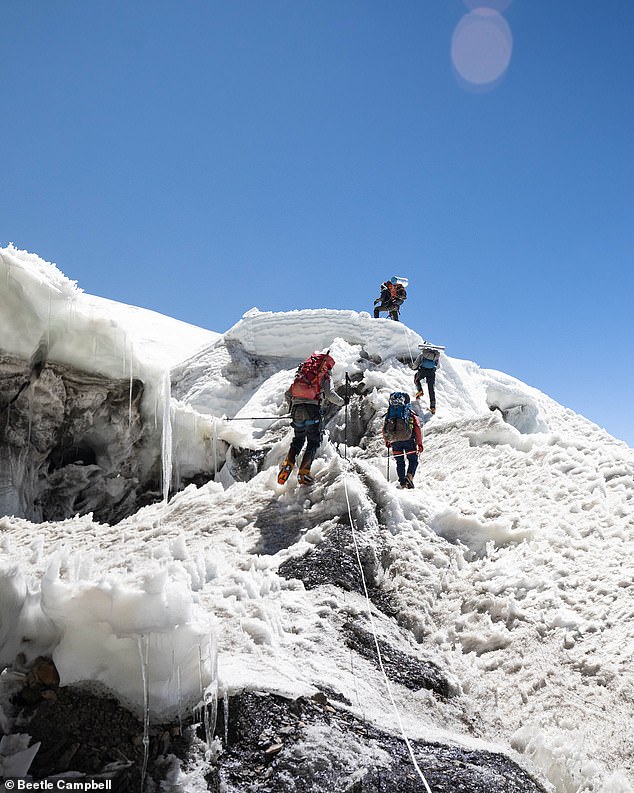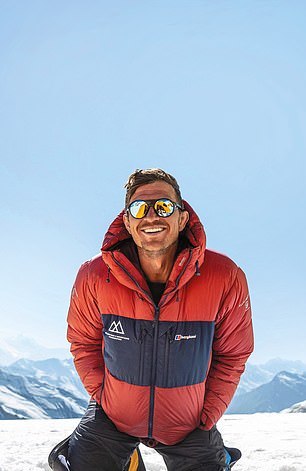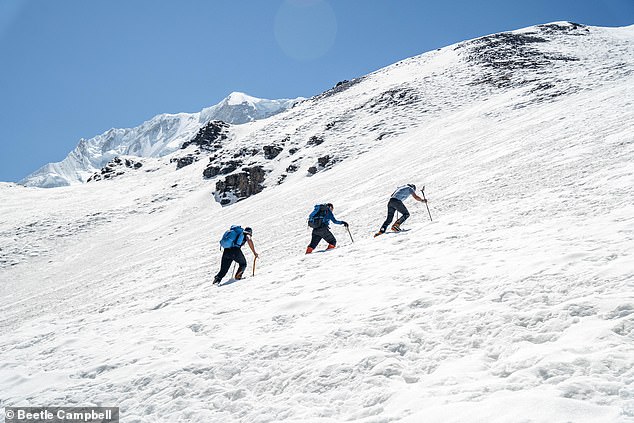From The Mountain’s Edge by Ed Jackson (HQ £16.99, 250pp)
With the sun shining brightly, though not for much longer, Ed Jackson and his small team of climbers stood trapped at 22,300ft, just below the summit of Himlung Himal deep in the Nepalese Himalayas.
They couldn’t go forward as they were surrounded by hidden crevasses, each covered by thick, fluffy snow that had failed to freeze. They would only know if the drop hidden by the snow was a few feet or several hundred when they stepped on it.
There was clearly no route through the brilliant white of the crevasse field. Isolated in this freezing wilderness, driven back by treacherous glaciers and terrible snow conditions, they could go no further.
They had no water, shelter or food. They hadn’t slept for 36 hours and their bodies were battered and bruised from the days of gruelling climbing.
It was too late to even attempt to descend further. There was no chance of a helicopter rescue till the next morning.
As the sun set, the temperature began to drop to -25C (-13F). They’d have to spend the night in the open and hope for the best… How would they ever make it?
There used to be a flood of mountain expedition books from publishers – and I should know, as I love climbing and have a ton of them on my shelves. Part of it was a huge interest stemming from the 1953 Everest triumph led by John Hunt’s largely British team, and partly a general vogue for exploration and a growing love of the outdoors.

Nowhere to go: Ed Jackson and his small team of climbers became trapped at 22,300ft when they realised they were surrounded by hidden crevasses
Now times have changed. Expedition books are no longer a sure-fire hit. Climbing has become too complicated with different grades of difficulty – with or without oxygen, with or without aid, new route or old route and so on – so it is hard for the general public to feel involved.
What publishers – and readers – seem to like are relatable people telling stories of exceptional endeavour in an extreme environment, rather than some bearded superhero ticking off another mountain triumph. And there can be few more relatable – or likeable – heroes than Ed Jackson.
A former professional rugby player with Bath and Wasps among others, his life was changed when he broke his neck at 28, in 2017, diving into the shallow end of a swimming pool.
He suffered serious spinal injuries and some medics said he would never walk again, but he proved them wrong – though his left side doesn’t function properly and he has problems controlling his temperature, as well as some bodily functions.
But he wasn’t going to let the accident define him. And, clearly driven by fierce determination, within a year he had summited Snowdon before turning his attention to higher, more demanding peaks.

Sporting star: Before his accident Ed played rugby for Wasps

Unconquerable: After his accident Ed set up Millimeters 2 Mountains – a charity which raises money to support those struggling with their mental health
He has founded a charity, Millimetres 2 Mountains (M2M), with his wife Lois to help people facing mental health challenges to use adventure to develop a brighter future.
And this hugely enjoyable book –vivid, observant and written with a crisp unfussiness – is about Jackson’s desire to push his limits yet further with the attempt to climb the 23,425ft Himlung Himal in 2022, accompanied by his three friends, Ben, Beetle, Arron and their guide Bigraj.
It’s a terrific adventure book as much as anything else, with vivid chapters on the beauty of Nepal and the warmth of the Nepalese, the hustle and bustle of Kathmandu, the long trek to the mountain via the remotest village in the world, and the climbing through the crevasses of Himlung Humal.
Jackson is under no illusions about what climbing entails. ‘High-altitude mountaineering is suffering,’ he writes. ‘It strips you down to the point where every other word is an expletive, as it is the only way to explain what you are going through.
‘Every step was a struggle and in the space of a few hours, we were accelerated into old age when every breath never quite gave us enough oxygen, so we would gasp for another.
‘It’s certainly not for everyone but for me it is the ultimate test of character and resilience and the rewards are unrivalled.
‘You discover things about yourself you never knew existed and develop areas you have always wanted to strengthen.’
That is as good a summation of the complex pleasures of climbing and mountaineering that I can think of. And there is great joy, too.
Jackson writes: ‘As I stared at the night sky the contrast of the physical output these climbs demanded compared with the mental clarity and calmness gained amazed me. In those moments I was truly present in my surroundings and life.’
And back to the night on the bare mountain. As the temperature began to plummet, resigned to the fact that the mountain would just not let them pass, Jackson started to shake uncontrollably as the adrenaline from the climb wore off.
All the team were struggling to stay awake, but they knew that falling asleep was how you died at these altitudes.
Your core temperature drops when you sleep and that could be fatal when you are subjected to temperatures of -25C. Your heart would simply stop beating.

The journey is what counts: While Ed and his team did not make it to the summit, Ed’s achievement was immense as when he damaged his spine he was told he would not walk again
They huddled together to preserve warmth, they sang, they told stories. As the icy cold seeped up through their bones from not moving, they all shivered violently.
But Jackson remembered that this wasn’t a bad sign. It was when you stopped shivering that you should be worried, as then your body is focusing on keeping your organs warm, which is the stage before dying.
Eventually, they did make it to the morning. And morning means daylight and daylight means warmth. And eventually the rescue helicopter arrived. The team had survived. They may not have made it to the top but that’s not really what climbing is about.
It doesn’t matter if you don’t reach the summit, though it’s important to have goals.
What matters in climbing is the process, the friendships, the experience, the teamwork, and the fact that your life is in the hands of others, and theirs in yours. If it wasn’t such an awful overused word, you could say it was the ‘journey’.
That’s the final lesson for Jackson: his second brush with death after his accident makes him realise how much more living there was to do, with his wife, his family and his friends.












